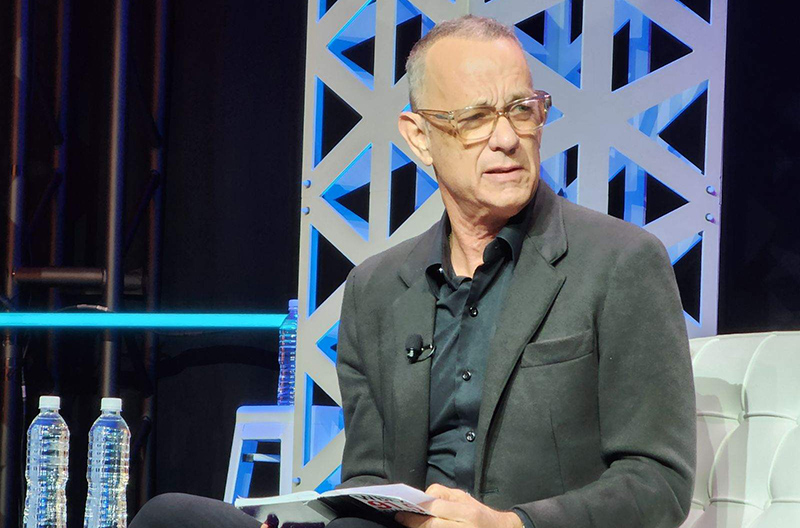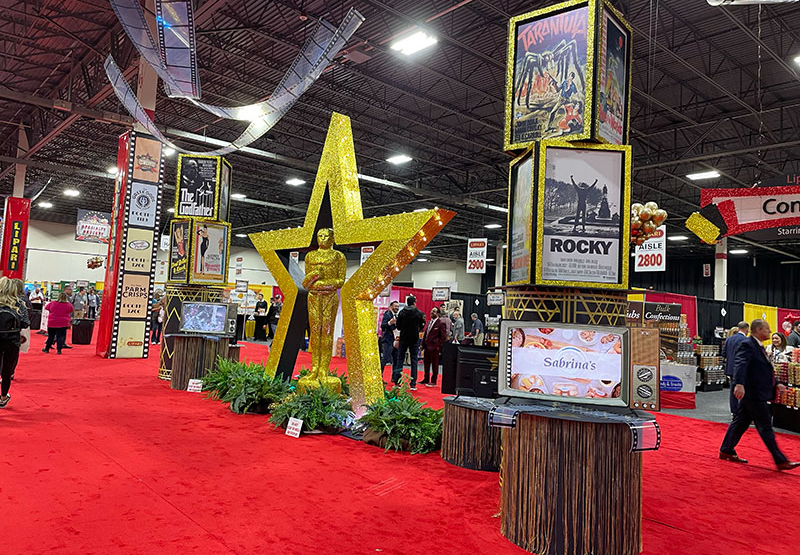The ballroom at the Anaheim Convention Center was standing room only as actor Tom Hanks took the stage June 5 at the 2023 IDDBA Show.
Know for his film roles in “Forrest Gump,” “Saving Private Ryan,” “Cast Away” and many others, Hanks also is a producer, director and writer. Attendees were given copies of his new novel, “The Making Of Another Major Motion Picture Masterpiece.”
Hanks talked about his life and his craft and – in the process – demonstrated that he is, indeed, a very funny man.
In experience business
In discussing his presence at the show, Hanks said, “We’re in the experience business,” adding that product and story go together.
Growing up, his dad was in the hotel and restaurant industry.
“I never walked into a restaurant through the front entrance until I started dating when I was 16, because of my dad. We all just went in the back, past the dumpsters, in through the storeroom, past the dishwasher. Dad would be saying every hello to everybody that we passed.”

Hanks said his family now spends their summers in Greece on a small island, and he really enjoys a good Greek salad.
“None of this produce is photo worthy when you’re buying it, except when you eat it, it’s the greatest stuff in the world, because it tastes like a tomato and it tastes like a cucumber.
“I will say this about the experience of eating watermelon in the United States, it is really not the same as when I was a kid because there’s no more seeds in them. They look great, but they taste like a food product as opposed to tasting like watermelon.
“And on the island in Greece, where they grow their own watermelons, yes, there are seeds. And yes, it takes a lot of work, but it tastes like candy! And we eat it with every single meal.”
Hanks said the aspect of experience is that it’s shared, the same as sitting down to a great meal, watching something on television or going to a movie.
“We can all remember a great meal that we had 17 years ago with some friends in a certain restaurant that was fantastic. Or somebody made something great at their home and we remember what that was like. It’s the same thing as seeing a good movie. I can tell you that I saw “Swiss Family Robinson” at the Grand Lake Theatre in Oakland, California, on a Saturday in 1967.
“We all remember this is why we go out, oftentimes in a room with a bunch of other strangers, to sit down and partake with a few of our group, a movie and a meal. I’m gonna say they last about the same amount of time if you’ve got good conversation. A couple hours, right? Time well spent – a good meal and a good story.”
Entering acting
Hanks said he went to a three-year high school in Oakland. “I did not know what to do other than to try to survive going to high school…but what do you do other than truly goofing around in hallways between classes? I did run track and it was kind of fun. But then I went and saw a friend of mine who was in the high school play. And it was a production of Dracula…And I just thought, this is school? You can get a grade for standing up and doing that? I do that in biology class!
“So the next thing I knew, I ended up taking every drama class that there was. This was back when California had a different tax structure and our public schools were very well supported; there was an awful lot of money. And there was a plethora of subjects – you could take drafting and you could take electrical engineering and you could take drama. And I lucked into being with a group of other people who could get up on stage like it was nothing at all.”
Hanks said he had heard once that the world is divided up into two categories, where “half of this room could get up here and do what I’m doing right now. And the other ones would run screaming in terror!”
When asked about performing Shakespeare, Hanks said he was lucky to work on a little production in Sacramento that was being directed by the artistic director of the Great Lakes Shakespeare Festival.
“He says, ‘now listen, Tom. I’ve been watching you, and I think that you could be an actor. I could use you at my theater in Cleveland, but I cannot pay you. I cannot pay you a dime. But I can give you something much, much, much, more valuable, and that is experience working in the professional theater.’ And he was absolutely right.

“I hadn’t even really read the plays. I was one of those guys that pretended to have read a bunch of stuff. Richard the Third, oh yeah, yeah. But I didn’t know any of it. But by going in there and becoming enmeshed and working with true professionals, I was there for three seasons, three years, and came out of it with an understanding that yes, I was one of the one half of all of us that could get up on stage like it’s nothing.
“But the responsibility of getting up there was huge…in order to get better at [the job you love], you have to work at it every single moment, on or off day. And that’s what I’ve been been doing ever since, one way or another.”
Hanks then quoted a bit of Shakespeare from Hamlet, adding that “the only reason I remember it is because I had to stand with a torch, like this, and hear it 68 times!”
Telling stories
When asked about how he gives such moving performances, Hanks said, “I don’t know really how to talk about it because somehow you would have to start explaining the process, which would be like Coca-Cola explaining the formula. I don’t want anybody to know what my process is. Not that I know what my process is, anyway. I couldn’t explain it.
“But it has been the same since I first kind of realized that this was a craft, as well as a science, as well as this very, very gossamer kind of artistic drive that is required. Every role I have taken on, there is a moment when you say ‘yes.’ And as soon as you say ‘yes,’ you’re going to do something, it grows inside you and you never stop thinking about it. And If you have eight months before you do the movie…you have eight months, then just to keep layering and layering and layering, all that stuff that might never, ever come out.

“I’ve been asked – because I’ve written books – isn’t that incredibly different than my day job, which is being an actor? And the answer is only in this fact – that I have to set down on paper all the stuff that is inside my head.
“If you take on a job, to be an actor, you start writing that role, stuff that will never be seen in the movie, but is a deep, deep, deep background for every scene that you are in. And the only way to do it is to ponder it, and think about it, and hold it to your heart. And when you sit down and write every morning at 5:30, it’s the same process, except you actually do have to do it in real time. You have to type it, you have to keep modifying it.
“As an actor, I don’t have to do it, no one has to see it. But if I’m on week seven of any movie I’ve ever done, I have to come in on the day, on week seven, with a huge amount of story, imagery and emotional baggage in my back pocket. And even if it’s just on getting into a car or getting on a horse or whatever it is, all that stuff has to be in that individual moment in real time.”
During the COVID-19 pandemic, Hanks wrote his novel. He described the writing process as “a beast that you must wrestle to the ground. But it is a magical and enjoyable experience despite the work. I wish I was good with tools. I wish I could fix a screen door. I wish I could build a house. I wish I could do carpentry. I wish I could do engineering. I don’t!
“But the pleasure, I think, that you would get from knowing how to build a home for yourself and your family to live in is probably the same experience you have of writing a 400- or 500-page novel. It is piece by piece. It is moment by moment. It is ‘that ain’t right, let me go back.’ It’s setting it aside in order to come back and fix it.
“But the process is as satisfying as scratching an itch that that must be scratched. When I’m on the clock and I am saying OK, I have a deadline or I have I have a time where I could invest in writing, I cannot wait to get to bed the night before. It’s 9:45, I start brushing my teeth so I can be in bed by 10. Because I’ve got to get up at 5:30 in the morning and have three or four hours alone in order to write. And it’s the most exciting part of the day. Then, of course, I’m a wreck.”
Hanks shared a story about watching actor Kirk Douglas on The Tonight Show with Johnny Carson. Douglas was talking about his autobiography, “The Ragman’s Son.” Doing an impression of Douglas’ distinctive voice, Hanks said Douglas shared that ‘the secret of writing is rewriting’ Hanks agreed with that assessment.
“You do, you just go down and you flood this thing and you go like crazy at it. And then you go back and you just keep honing and honing, and it never stops being incredibly pressure filled, without a doubt. But at the same time, ridiculously rewarding. Different, certainly, from being in a movie because no one is changing my clothes for me, no one is telling me I have to do something. It’s all just me sitting down with the keyboard.”
Hanks shared that he collects typewriters and they number over a hundred. “Why? I think, maybe, madness?”
“Most of the typewriters I have are worth 50 bucks apiece. And when I sign them, they’re worth 52 bucks apiece!”
No genre preference
When asked if there is a genre he prefers, Hanks answered no. “Because there is no substitute for a story well told. I gravitate toward only the stuff that is incredibly engaging. I will say this, there is a whole kind of adventure movie, a whole type of genre movie, that is fantastic. And you love to throw yourself at it. It’s great.”
Referencing Shakespeare again, Hanks said there is a line in Hamlet where the players are told that their job is to hold the mirror up to nature. “And that’s what I still go for now. I think the best movies are funny and dramatic and real and authentic…so it’s all about that authentic engagement that goes on.”
Hanks has done several roles, in addition to writing screenplays, centered around the military and war.
“I will tell you the the reason I keep going back to the concept of people in the military, I did stuff that requires no small amount of research. I’ve also been involved with a number of organizations that take into account everything that happens after people serve in the military.
“When I was in the formative years – I was born in 1956. I’m 66 years old – I’m going to say until I was in junior high, every single adult in my life – every relative, every caregiver, every parent of a friend, had the war – World War II – as this great divider in their lives.
“And I remember being fascinated by the 1930s, the Great Depression, because I’ve always read history and what really happened to people. If you read John Steinbeck, you’ll learn about the Great Depression. So my dad and all of his cohorts, which by the way, in 1966, were in their 40s, so they were still young people. They grew up at a time where strep throat could kill you, or kill your sister. They grew up at a time where the only way you could fix your dental ache was by having the tooth removed. There was a difference between going to bed with just enough to eat and going to bed hungry. So that’s how they grew up. Right?
“Then the war comes along, right about the time they’re getting out of high school. And for the next five years or so, they’ve put their lives in total stasis. They had no idea what was going to happen for about four years, from 1939, to somewhere around 1943. That’s when the tide turned.
“So for those four years, who’s going to win this thing, the Nazis? The Japanese empire? Is the world going to be broken up into free and enslaved? That was literally how they woke up every single day – not just the men who were serving, but also the kids who were 8 years old and the moms who were trying to get by themselves.
“And their lives were broken up into three very distinctive acts that they talked about all the time. Being a little kid at dinner, my dad and somebody else are all talking about it – ‘that was before the war.’ And ‘before the war ‘became this gestalt for that was when things were safe, but scary. Then, ‘well, that was established during the war,’ and that meant who knows what’s going on.
“There were sayings, you know, Golden Gate in ’48, that means the war would be over in 1948. There was ‘They’re not done ‘til ’51.’ They had no idea that the war was not going to go on until 1951.
“So I have always been kind of fascinated [by this]. They were talking about the war like it was when the kraken came down from on high and held sway over everybody. Then the rest of their lives, ‘Well, that was after the war.’ And they’re talking about that third act.”

Hanks’ new book, which he pointed out is a novel, not a memoir – “because that would be a waste of time, because you’re getting it right now” – is the experience of a 19-year-old kid who went off to fight the war in Japan. His experiences acted as a catalyst for a character in the movie.
“It’s like a superhero movie, but the root of that character does come down to this, why I’ve read history a lot. And if I was playing a guy like this, I would search out this kind of detail.”
Hanks said he was reading a story about Fred Smith and FedEx, “And I did not realize that they had airplanes – jumbo jets – filled with nothing but letters or packages that flew across the Pacific Ocean every day. I did not know that. And I thought, well, what happens if one of those goes down? Eight years later, we have the motion picture [Cast Away]. That’s how long it took.”
He said he had read how outlaw motorcycle gangs, which were a product of the 20th century, came about. Veterans, typically Marines, “came back from fighting in the Pacific War, and had done so much hellacious things and seen so many hellacious things, that there was no way these one-time 19-year-old kids, who are now in their early 20s, could go back and become insurance salesman.
“They spent their money on war surplus motorcycles and lived as they did as soldiers…so I took that character…the difference between 1941 and 1945 were so brutal and so complete, that this guy was lost. And his nephew ends up writing a comic book that is about him that ends up stirring a motion picture director, who was looking for a very specific kind of dynamic, and that’s how movies are made.”

Hanks said all the movies he has been involved with have been “populated by fascinating people with amazing stories of how they ended up in this very specific place…the telling of a story in a movie means everybody has to understand the story they are telling, the movie they’re making, the theme they are examining, they have to know what that is. And when they do, it works. And when they don’t, it might not work. It’s all kind of like a crapshoot anyway, sometimes, but it’s the stories of the people on any individual day, showing up on time, knowing what they want to do and having a good idea in their head in order to make it better.”
Hanks said he has written screenplays as well, which are “kind of like writing blueprints. But even inside there, you have to communicate the movie, the fading, the idea, the pacing, the heart of it. Taking it over into a novel just means I got to control absolutely everything. When you write a novel, you’re the art director, you’re the costume designer, you’re the film editor, you get to do it all. When you’re making the movie, it’s part of a great collaborative process.”
Craft services on set
Getting back around to food, Hanks said on a set, there is a caterer who will make meals, but there is also “the crafty truck or the craft service table, and the artistry that goes into making sure that food is fresh and good and different, with a great variety, stuff that is so good and healthy for you and stuff that will kill you over time.
“Doughnuts have become what we call, ‘Do you have any good glazed rings of death?’ Because I’m going to tell you that no matter how good I am with my physical regimen for a movie, if they have the rainbow sprinkles, slice half of that for me. I’ll just have half of a glazed ring of death. You’ve got to have it.
“But it’s almost like there’s a science to it. In the morning, we need the healthy stuff, so there’ll be oatmeal and that type of stuff. And a lot of fruit. You can eat every type of food you can have, then out comes the comfort food later on. ‘Hey, we can get this pizza.’ ‘Oh, perfect slices of peanut butter and jelly.’ ‘Uh oh, here comes the macaroni and cheese!’ And they bring it around to you because there’s a lot of people on the crew…that can’t get down to the craft service.
“If you subscribe to this role of nutrition, eat the right food about every three hours – a little protein, a little fat, a little carbohydrate – about every three hours through the day, this is how you can live, thanks to the craft service table. I think if I had an ounce of discipline in my body, I would be the healthiest motion picture maker on planet Earth, because I would just eat off the craft service table and eat perfect food throughout the day. But damn those glazed rings of death!”
For more information about the show, visit iddba.org/iddba-show/about/iddba-2023.







Add Comment